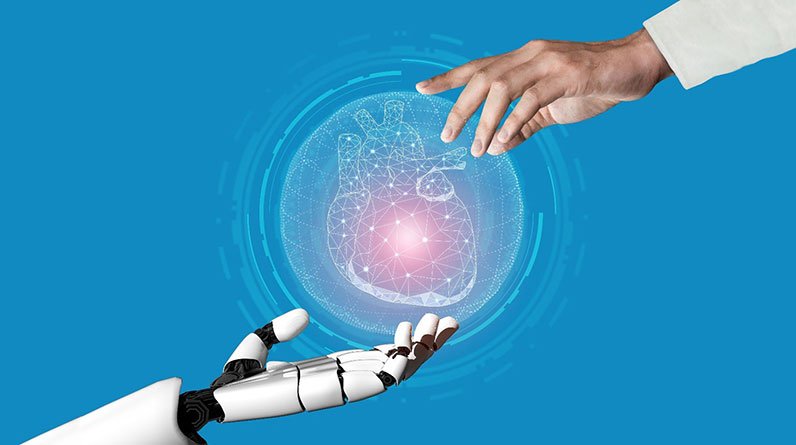
AI in Cardiovascular Health
In an era where advancements in medical science are transforming healthcare paradigms, the field of cardiovascular health stands at the forefront of innovation.
With cardiovascular diseases continuing to be a leading cause of mortality worldwide, the imperative to enhance diagnostic precision, treatment efficacy, and patient outcomes has never been more pressing.
As the medical community strives to navigate the complexities of heart-related conditions, a groundbreaking ally has emerged in the form of Artificial Intelligence (AI). The relationship between AI and cardiovascular health is rewriting the narrative of patient care, ushering in a phase of personalized medicine, early intervention, and data-driven insights.
In what follows, we’ll delve into the profound impact of AI on the landscape of cardiovascular health, exploring its applications, benefits, and the promises it holds for a healthier future.
Traditional Evaluations of Heart Health
Regarding general human health, the heart emerges as both a symbol of vitality and an organ of intricate detail.
For centuries, healthcare professionals have studied the science within its chambers and rhythms, driven by the urgency to prevent and treat cardiovascular diseases.
This pursuit has produced a range of evaluation methods, each offering critical information to determine the condition of the heart. These traditional approaches have been the bedrock of cardiac management.
Vital Signs: Gauging the Body’s Alarms
For generations, healthcare professionals have relied on vital signs to assess the overall health of individuals, particularly in matters concerning the heart. Parameters such as heart rate, blood pressure, respiratory rate, and body temperature serve as an important snapshot of cardiovascular function.
Elevated heart rates or irregular rhythms, for instance, can hint at underlying cardiac stress or arrhythmias. While vital signs are invaluable tools for initial assessments, they provide only a surface-level understanding of heart health. Deeper insights necessitate more comprehensive evaluations.
Physical Examinations: The Art of Detection
Physical examinations conducted by trained healthcare providers have long been a cornerstone of medical practice. Through palpation, auscultation, and observation, clinicians gather information about the heart’s structure and function. Murmurs, irregular rhythms, and abnormal chest sounds can be detected, guiding further investigations.
However, physical examinations are subject to the limitations of human perception and may not detect subtle abnormalities. Moreover, other insights require much more information.
Imaging Techniques: Peering Inside the Heart
The advent of medical imaging techniques, including X-rays, ultrasounds, and Electrocardiograms (EKGs), has revolutionized our ability to evaluate the heart in more intricate detail.
- X-rays: X-ray imaging, also known as radiography, provides a two-dimensional view of the heart’s silhouette. This helps identify structural abnormalities such as enlarged chambers or calcifications.
- Ultrasounds (Echocardiograms): Echocardiography, or cardiac ultrasound, employs sound waves to create dynamic images of the heart’s structures and blood flow. This non-invasive technique allows visualization of cardiac chambers, valves, and even the motion of heart walls.
- Electrocardiograms (EKGs): EKGs record the heart’s electrical activity, mapping out the heart’s rhythm and detecting irregularities. They play a crucial role in diagnosing arrhythmias and assessing heart rate variability.
The evolution of medical techniques for evaluating heart health has been marked by continued innovation. Traditional methods, including vital sign monitoring, physical examinations, and basic imaging, have laid the foundation for managing cardiac well-being.
Yet, the limitations inherent in these diagnostics have spurred the development of more advanced and intuitive methods. AI applications are adding to this advancement, with groundbreaking data to back them.
AI Applications in Heart Health
Advancements in medical technology have ushered in an era where Artificial Intelligence (AI) is now in a position of revolutionizing cardiovascular care.
AI’s computational prowess and ability to decipher intricate patterns within complex data have propelled it into an indispensable tool across various aspects of heart health assessment.
Imaging Redefined with AI Precision
The integration of AI into medical imaging has redefined our ability to peer into the intricate landscape of the heart. Through techniques like magnetic resonance imaging (MRI), computed tomography (CT), and echocardiography, AI has transcended human limitations by meticulously analyzing a large volume of image datasets.
AI algorithms excel in identifying subtle anomalies, such as the early signs of arterial blockages or tissue irregularities. The result is not just increased accuracy but also efficiency, as AI-assisted image analysis accelerates diagnosis and subsequently paves the way for prompt interventions.
Decoding EKGs with AI Interpretation
The Electrocardiogram (EKG) has long been a cornerstone in cardiac diagnostics, offering a snapshot of the heart’s electrical activity. However, interpreting complex waveforms and identifying irregularities requires expert training and experience.
This is where AI has found its niche. AI-driven EKG interpretation algorithms can swiftly analyze countless data points, detecting subtle deviations from normal rhythms with remarkable precision.
Whether it’s diagnosing arrhythmias or spotting signs of impending heart attacks, AI’s ability to analyze patterns at a speed beyond human capacity has elevated the accuracy of EKG interpretation, helping clinicians to make informed decisions rapidly.
Monitoring Redefined with AI
Cardiac monitoring, both within healthcare settings and remotely, has taken a giant leap forward with AI’s integration. In intensive care units, AI-powered algorithms can process real-time physiological data, raising alerts when parameters veer outside safe ranges.
Similarly, wearable devices equipped with AI-driven monitoring capabilities allow individuals to proactively manage their heart health. These devices analyze data like heart rate, blood pressure, and even sleep patterns to provide personalized insights.
Final Thoughts
The connection between Artificial Intelligence and heart health assessment represents a
paradigm shift that extends beyond technological advancement. AI’s applications in
imaging, EKG interpretation, and cardiac monitoring offer a partnership of human
expertise with machine efficiency, resulting in more accurate diagnoses, faster
interventions, and improved patient outcomes.
